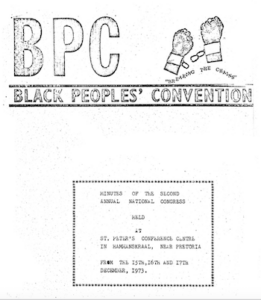
The B.P.C. memorandum
*The Black People's Convention (BPC) was formed on this date in 1972. This group was a national coordinating body for the Black Consciousness movement in South Africa.
With the influence of the growing South African Students' Organization (SASO), Black Consciousness leaders called for forming a new Black Consciousness political organization to engage and mobilize a broader civil society outside the universities. The shape of this national umbrella body, which became the BPC, was discussed at a series of conferences in 1971. Winnie Kgware was elected its first president. The BPC became a significant alternative source of ideological and organizational support for resistance to the system of apartheid.
The BPC subscribed to a Black Consciousness philosophy, as articulated by Steve Biko. Membership was closed to whites. According to its constitution, the BPC's principal aim was to foster black political unity and solidarity towards psychological and material liberation for blacks in South Africa. The BPC opposed apartheid through non-violent means and non-participation in the apartheid system. It also advocated for an equitable economic system based on socialism and what it called "black communalism."
This traditional African economic system variant was modified for a modern and industrialized economy. It entailed communal ownership and state custodianship of all land. The Black People's Convention was banned in 1977.